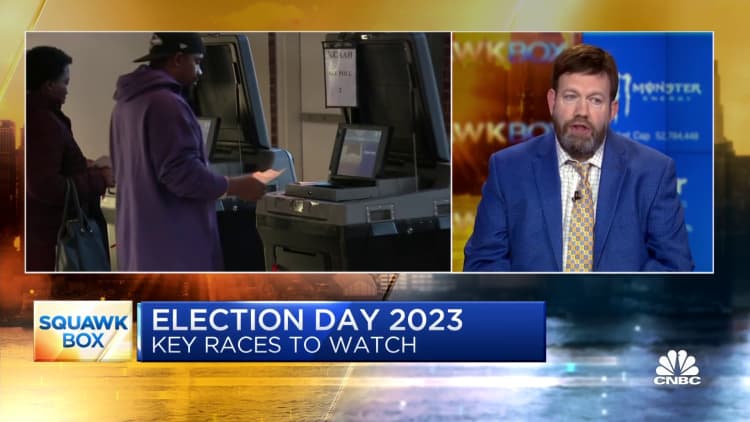For many Americans, planning for retirement may feel like a daunting financial goal.
Now, there's another risk on the horizon that may stoke their worries — the 2024 elections.
Almost half of investors — 45% — surveyed by Nationwide Retirement Institute believe next year's presidential and congressional contests will have a greater impact on their retirement plans and portfolios than market performance.
More than two-thirds — 68% — of Republican investors believe the election outcome will have a direct and lasting impact on the stock market, versus more than half — 57% — of Democratic investors.
The online survey, which was conducted in August, included 2,404 investors ages 18 and up, as well as 507 financial advisors and other professionals.
The results also showed respondents believe the stakes are high for the economy, with nearly 1 in 3 respondents — 32% — believing the economy will fall into a recession if the party they do not support wins.
Older investors are most fearful because of the lasting impact a recession may have on their retirement. Pre-retirees ages 55 to 65 are more concerned about an economic downturn and inflation, the results found. And, one-third, or 33%, of that cohort are managing their investments more conservatively ahead of the 2024 election, compared to 31% of non-retirees.

"As elections approach, people tend to overestimate the impact of elections on what they think the equity markets are going to do," said Eric Henderson, president of Nationwide Annuity.
"As we think about saving and preparing for retirement, that's obviously a much longer-term outlook," Henderson said. "Historically, presidents don't have a significant impact for the long term on equity markets."
Social Security on the ballot in 2024
While it remains to be seen just how much the election will affect markets, the 2024 election is poised to have an impact on Social Security, which replaces about 40% of Americans' pre-retirement income on average.
The trust funds on which Social Security relies to help pay benefits are projected to run out in 2034, at which point 80% of benefits will be payable.
Leaders elected next year will likely have a say on any adjustments made ahead of that depletion date.
The news cycle, in particular, is noise and that heightens anxiety.Preston Cherrypresident of Concurrent Financial Planning
Former President Donald Trump, who is in the lead in Republican polls, has vowed to leave entitlements like Social Security and Medicare untouched.
Florida Governor Ron DeSantis, who is second in GOP primary polling, said during this week's Republican debate that his message to seniors who currently collect benefits is, "Promise made, promise kept."
However, it is possible future beneficiaries may see changes.
Republican candidates were divided on whether to raise the retirement age. Meanwhile, former New Jersey Governor Chris Christie suggested the wealthy should not take benefits they do not need.
What moves experts recommend
Financial advisors also believe the election may have consequences for the markets, Nationwide's survey found. While 46% of those polled said they see inflation as the biggest challenge to retirement portfolios, 38% said they expect the stock market to be volatile for 12 months after the election if the party they do not side with wins.
More than half of advisors — 56% — said they think staying the course is best when it comes to investing in an election year. Yet almost all — 96% — are implementing strategies aimed at protecting clients from market risk.
The top strategies they are using includes buying annuities; diversifying and focusing on non-correlated assets; and using more liquid investments like mutual funds and ETFs.
"If someone has a good plan, the main thing is to stay the course," Henderson said.
If you don't know what you plan is, it is a good idea to meet with a financial advisor to come up with one, he said.
Research shows investment returns tend to average out, regardless of which party is in the White House, noted Preston Cherry, a certified financial planner and founder and president of Concurrent Financial Planning in Green Bay, Wisconsin. Cherry is also a member of the CNBC Advisor Council.
"The noise of elections … the news cycle in particular is noise and that heightens anxiety," Cherry said. "I would suggest for people to not let noise have an overwhelming impact on their emotions and decisions and to be more informed on the information that matters to their own households."
While some retirees may be tempted to claim Social Security benefits early due to the program's future uncertainty, experts still say it's still generally best to wait to claim, if possible.





